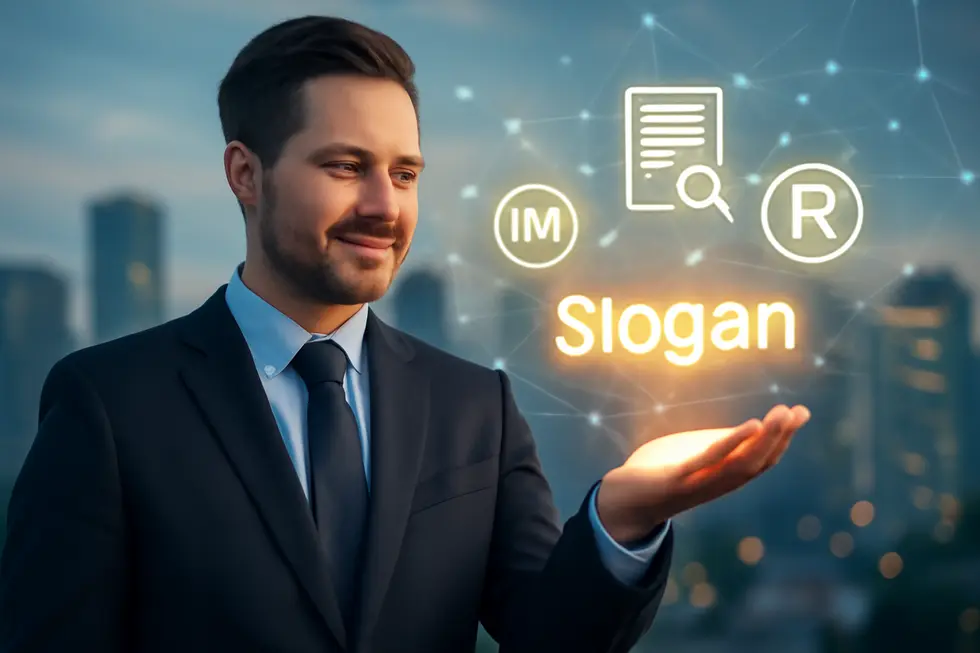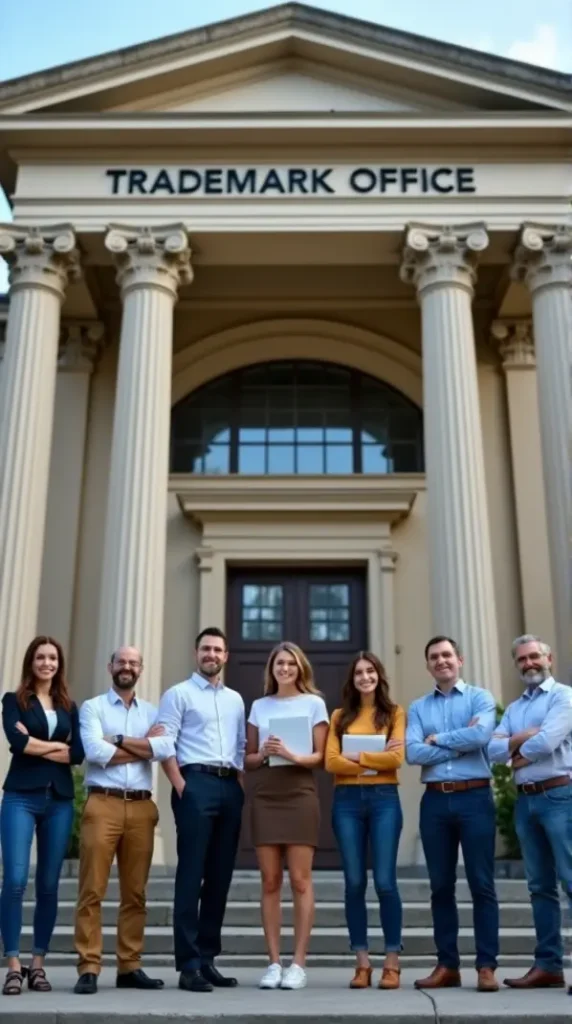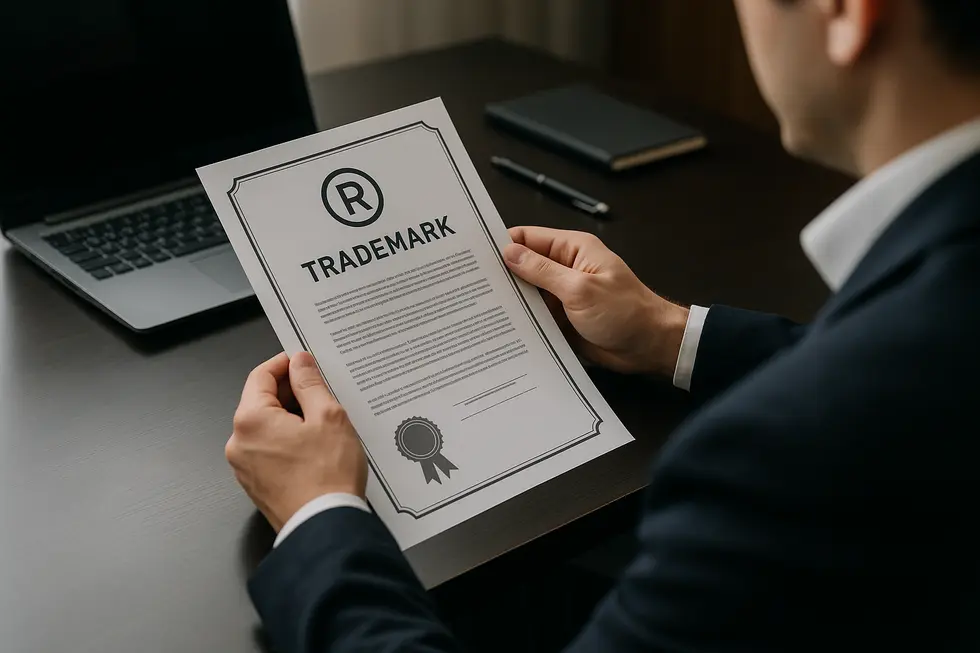Введение
Слоган может стать одним из самых мощных элементов вашей деловой идентичности, помогая вам выделиться на конкурентном рынке. Однако многие предприниматели ошибочно полагают, что их слоган автоматически защищается законом об авторском праве. Понимание того, почему слоганы не подлежат защите авторским правом, и правильных юридических путей их защиты очень важно для сохранения уникальности вашего бренда. В этой статье мы рассмотрим ограничения авторского права в отношении слоганов, объясним, почему оптимальным подходом является защита товарного знака, и расскажем вам о практических шагах по регистрации слогана в качестве товарного знака, чтобы обеспечить исключительные права и предотвратить неправомерное использование.
Оглавление
Глава 1: Понимание того, почему нельзя защищать слоган авторским правом: юридические и творческие ограничения
- Почему закон об авторском праве исключает слоганы: Исследование правовых и творческих границ
- Почему закон о товарных знаках служит ключевой защитой для слоганов в условиях ограничения авторских прав
- Творческие границы авторского права: Почему слоганы не подлежат защите
Глава 2: Исследование возможности авторского права на слоган: товарный знак как оптимальный способ защиты
- Разъясняя, почему авторское право не работает: правовые основы, благоприятствующие охране товарных знаков для слоганов
- Навигация по пути регистрации товарного знака: Обеспечение юридической силы вашего слогана
- Использование силы товарного знака: необходимый правовой щит для слоганов
Глава 3. Практические шаги по защите авторских прав на слоган: регистрация слогана в качестве товарного знака
- Навигация по поиску товарного знака: Убедитесь в уникальности вашего слогана до регистрации
- Как подготовить и подать заявку на охрану товарного знака для слогана
- Освоить путь регистрации товарного знака в USPTO: Исчерпывающее руководство по защите вашего слогана
Глава 1: Понимание того, почему нельзя защищать слоган авторским правом: юридические и творческие ограничения
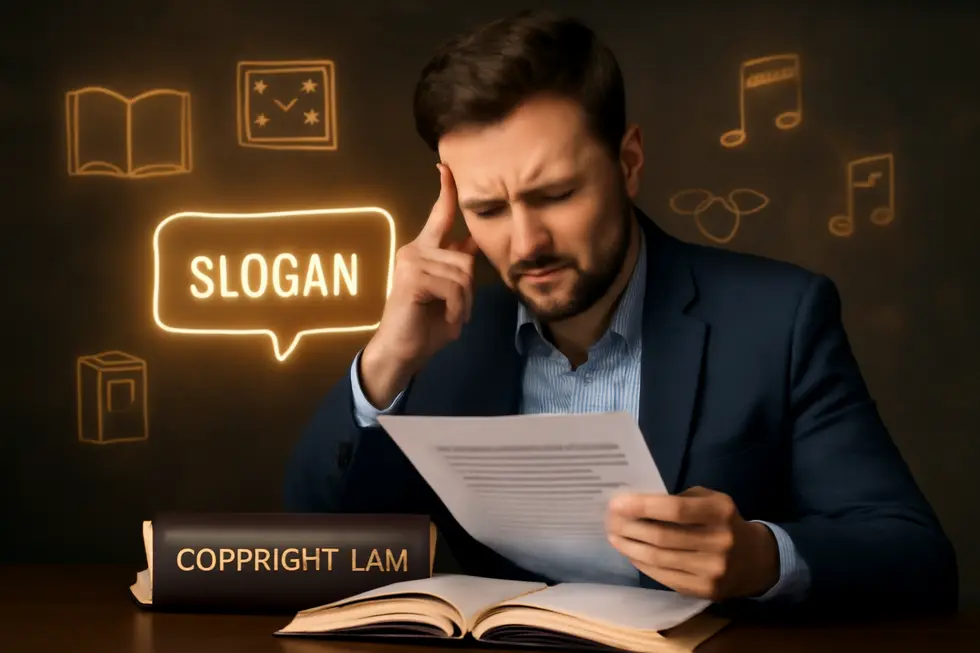
1. Почему закон об авторском праве исключает слоганы: Исследование правовых и творческих границ
Закон об авторском праве защищает оригинальные авторские произведения, зафиксированные на материальном носителе, например, книги, музыку или произведения искусства. Однако слоганы не соответствуют этому порогу, поскольку они, как правило, представляют собой короткие фразы, не обладающие необходимой оригинальностью и креативностью. Авторское право требует минимальной степени творческого авторства и фиксации, а слоганы, являющиеся краткими выражениями или крылатыми фразами, считаются недостаточно содержательными, чтобы соответствовать требованиям. Суды и Бюро по авторскому праву США постоянно подчеркивают, что слоганы функционируют как коммерческие идентификаторы или маркетинговые инструменты, а не как творческие произведения, зафиксированные в материальной форме.
Юридическое обоснование исключения слоганов из охраны авторских прав лежит в природе самого авторского права. Оно не распространяется на имена, названия, короткие фразы или идеи, поскольку они считаются слишком минимальными или функциональными, чтобы требовать охраны. Авторское право направлено на защиту выразительных произведений, воплощающих творчество и оригинальность, в то время как слоганы служат в основном для идентификации и продвижения товаров или услуг в торговле.
Вместо этого, законодательство о товарных знаках предлагает соответствующую правовую базу для защиты слоганов. Товарные знаки защищают слова, фразы, логотипы или символы, используемые для различения источника товаров или услуг. Слоган, зарегистрированный в качестве товарного знака, предоставляет исключительные права на его использование в коммерческой деятельности и возможность предотвратить использование другими лицами сходных до степени смешения знаков. Такая защита отражает коммерческую цель, которой служат слоганы, идентифицируя и выделяя бренды на рынке.
Это различие между охраной авторских прав и товарных знаков подчеркивает правовые и творческие ограничения, лежащие в основе авторского права. В то время как авторское право обеспечивает защиту оригинального выразительного содержания, слоганы не подпадают под его действие из-за своей краткости и функционального характера. Для более глубокого понимания того, как охрана товарных знаков отличается от охраны авторских прав и как она применяется к бизнесу, можно воспользоваться такими ресурсами, как статья LegalZoom о товарные знаки против авторских прав дают ценные сведения.
2. Почему закон о товарных знаках служит ключевой защитой для слоганов в условиях ограничений авторского права
Закон об авторском праве предназначен для защиты оригинальных творческих выражений, зафиксированных в материальной форме, таких как книги, музыка или произведения искусства. Поскольку слоганы, как правило, очень коротки и не обладают необходимой оригинальностью или творческой глубиной, они не отвечают требованиям охраны авторского права. Краткость и функциональный характер слоганов означают, что они обычно рассматриваются как простые фразы, а не как выразительные произведения. Это правовое ограничение отражает основное намерение авторского права защищать творческое содержание, а не короткие текстовые фрагменты, используемые в коммерции.
Вместо этого слоганы находят свое правовое убежище в законе о товарных знаках. Товарные знаки защищают идентификаторы бренда - названия, логотипы и слоганы, которые однозначно отличают товары или услуги одной компании от товаров или услуг другой на рынке. Чтобы претендовать на охрану товарного знака, слоган должен быть отличительным, то есть он либо уникально идентифицирует бренд, либо приобрел вторичное значение среди потребителей. Обобщенные или чисто описательные фразы, как правило, не проходят этот тест. После регистрации в Ведомстве США по патентам и товарным знакам (USPTO) товарные знаки предоставляют компаниям исключительные права на использование их слоганов в связи с конкретными товарами или услугами, что помогает предотвратить путаницу среди потребителей.
Это различие между авторским правом и товарным знаком отражает основные правовые и творческие границы слоганов. Авторское право, ориентированное на оригинальное авторство, исключает короткие, функциональные элементы, такие как слоганы, в то время как закон о товарных знаках, направленный на защиту узнаваемости потребителями и идентичности бренда, идеально подходит для слоганов. В результате, если компания стремится защитить слоган юридически, подходящей стратегией является регистрация товарного знака.
Чтобы узнать больше о защите идентификаторов вашего бренда и преимуществах регистрации товарного знака, изучите подробное руководство по охраняемые законом товарные знаки.
3. Творческие границы закона об авторском праве: Почему слоганы не подлежат защите
Авторское право призвано охранять оригинальные авторские произведения, которые демонстрируют достаточное творческое выражение и зафиксированы на материальном носителе. Эта правовая база по своей сути исключает короткие фразы, такие как слоганы, поскольку они, как правило, не отвечают необходимым критериям творческого подхода и фиксации. Слоганы часто лаконичны, в них используются общие слова или знакомые выражения, которые не демонстрируют оригинальности или творческой искры, необходимых для охраны авторского права. Более того, авторское право прямо исключает имена, названия, короткие фразы и идеи, признавая, что эти элементы слишком минимальны или универсальны, чтобы гарантировать исключительные права.
Творческий порог в авторском праве сравнительно высок. Благодаря этому охрана предоставляется только значительным произведениям, таким как книги, музыка или произведения искусства, в то время как повседневные выражения, такие как слоганы, остаются доступными для публичного использования. В отличие от этого, законодательство о товарных знаках учитывает различительную способность слоганов в коммерции, предоставляя охрану, когда они функционируют как идентификаторы бренда, отличающие товары или услуги. Однако товарные знаки также требуют, чтобы слоганы не были ни родовыми, ни просто описательными, поскольку предоставление монополии на общеупотребительные выражения ограничило бы конкуренцию и коммуникацию.
Таким образом, хотя слоганам не хватает творческой сложности для авторского права, они могут претендовать на охрану товарного знака, если они уникально обозначают бренд на рынке. Это различие отражает баланс: авторское право защищает оригинальное творческое выражение, в то время как закон о товарных знаках защищает символы и фразы, которые служат целям коммерческой идентификации. Эта система обеспечивает доступность общепринятого языка, позволяя брендам обеспечить эксклюзивное использование отличительных слоганов. Для получения более подробной информации об исключениях из правил интеллектуальной собственности см. всеобъемлющий ресурс.
Глава 2: Исследование возможности авторского права на слоган: товарный знак как оптимальный способ защиты
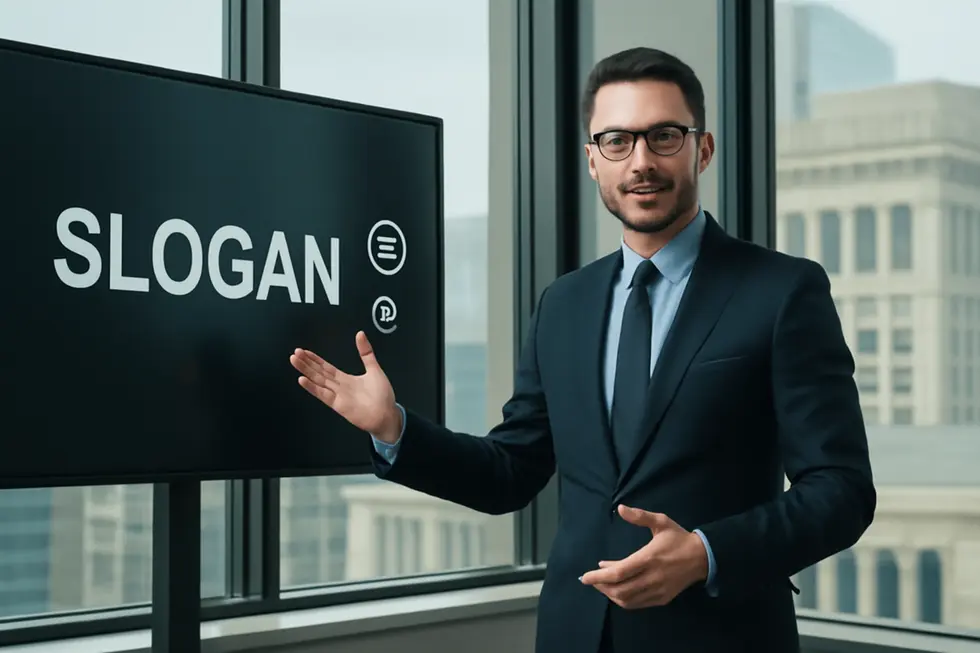
1. Разъяснение того, почему авторское право не работает: правовые основы, благоприятствующие охране товарных знаков для слоганов
Закон об авторском праве защищает оригинальные творческие работы, зафиксированные на материальном носителе, такие как книги, музыка и произведения искусства. Однако слоганы, как правило, не отвечают этим требованиям, поскольку представляют собой краткие фразы, не обладающие оригинальностью и фиксацией, необходимыми для защиты авторских прав. Их краткость означает, что слоганы не считаются литературными или художественными произведениями в соответствии с законом об авторском праве. Эта правовая база разъясняет, почему авторское право не распространяется на слоганы, независимо от их творческой привлекательности.
Напротив, законодательство о товарных знаках специально разработано для защиты идентификаторов, которые отличают товары или услуги на рынке, включая слоганы. Основная функция слогана - служить идентификатором бренда, помогая потребителям узнавать и отличать товары или услуги одной компании от других. Чтобы получить охрану товарного знака, слоган должен быть отличительным и активно использоваться в торговле. Регистрация в Ведомстве США по патентам и товарным знакам (USPTO) еще больше укрепляет эти права, предоставляя владельцу исключительное право использования в определенных категориях.
Это различие между авторским правом и товарным знаком имеет решающее значение. В то время как авторское право возникает автоматически в отношении произведений, охраняемых авторским правом, товарные знаки требуют активного коммерческого использования и регистрации для получения всесторонней защиты. Законодательство о товарных знаках также направлено на предотвращение путаницы среди потребителей путем ограничения использования схожих идентифицирующих знаков, в то время как авторское право защищает от несанкционированного копирования творческих выражений. Например, если художественные элементы логотипа могут быть защищены авторским правом, то его использование в качестве символа бренда охраняется товарным знаком.
Таким образом, слоганы получают самую сильную и подходящую правовую защиту через закон о товарных знаках, а не через авторское право. Чтобы эффективно ориентироваться в этих тонкостях, можно подробнее узнать о том, как товарный знак препятствует использованию защищенных идентификаторов бренда другими лицами, на сайте Ресурс Trademark Gold о предотвращении использования товарных знаков. Это понимание жизненно важно для тех, кто стремится защитить слоган в правовых границах интеллектуальной собственности.
2. Навигация по пути регистрации товарного знака: Обеспечение юридической силы вашего слогана
Навигация по пути регистрации товарного знака: Обеспечение юридической силы вашего слогана
Если вы хотите защитить слоган, регистрация товарного знака является наиболее эффективным и комплексным подходом. В отличие от авторского права, которое не распространяется на короткие фразы, законодательство о товарных знаках призвано защищать такие элементы бренда, как слоганы, логотипы и названия, которые однозначно идентифицируют товары или услуги в коммерции. Процесс регистрации в Ведомстве США по патентам и товарным знакам (USPTO) подтверждает исключительные права и позволяет владельцам предотвратить несанкционированное использование, которое может привести к путанице среди потребителей.
Работа начинается с тщательного поиска товарного знака, чтобы убедиться, что слоган является отличительным и не сходен до степени смешения с существующими товарными знаками. Этот шаг очень важен, чтобы избежать отказа из-за противоречий. После успешного поиска заявители готовят и подают заявку в электронном виде через Систему электронных заявок на товарные знаки (TEAS) USPTO. В заявке подробно описываются коммерческая принадлежность, характер товаров или услуг, связанных со слоганом, а также описывается, как слоган используется или будет использоваться в коммерческих целях, с приведением его в соответствие с надлежащими классификационными кодами.
После подачи заявитель получает квитанцию о подаче, подтверждающую подачу заявки и присваивающую ей порядковый номер. Затем USPTO назначает эксперта, который тщательно изучает заявку на предмет соответствия правовым нормам и выявления возможных конфликтов. Если проблем не возникает, слоган публикуется в официальном бюллетене на 30-дневный период возражений, что позволяет третьим лицам оспорить товарный знак, если у них есть обоснованные опасения.
При отсутствии возражений или успешном разрешении споров USPTO выдает свидетельство о федеральной регистрации. Это дает общенациональные исключительные права на использование слогана в связи с зарегистрированными товарами или услугами, обеспечивая надежную защиту, которая может длиться бесконечно долго при надлежащем обслуживании и продлении. Владение товарным знаком повышает узнаваемость бренда и защищает от конкурентов, которые могут попытаться извлечь выгоду из аналогичных слоганов.
Типичный срок получения товарного знака составляет от шести до восемнадцати месяцев, а стоимость подачи заявки обычно начинается от $350 за класс товаров или услуг. В отличие от защиты авторских прав, ориентированной на оригинальное художественное выражение, защита товарных знаков нацелена на коммерческие идентификаторы, что делает ее точно подходящей для слоганов. Для предприятий, стремящихся защитить свои уникальные слоганы, этот процесс регистрации представляет собой наиболее надежную правовую основу.
Для получения более подробной информации о регистрации товарного знака и его преимуществах изучите следующие ресурсы Юридическая защита вашего бренда с помощью товарных знаков. Кроме того, на официальном сайте USPTO можно найти исчерпывающие инструкции и обновления по процедуре регистрации.
https://www.uspto.gov/trademarks/basics
3. Использование возможностей товарного знака: необходимый правовой щит для слоганов
Использование силы товарного знака: необходимый правовой щит для слоганов
Слоганы, хотя и являются впечатляющими и запоминающимися, не подлежат защите авторским правом. Это ограничение возникает потому, что закон об авторском праве требует, чтобы произведение было оригинальным и зафиксированным на материальном носителе - критерии, которым короткие фразы и слоганы обычно не соответствуют. Вместо этого закон четко признает слоганы в качестве идентификаторов бренда, что делает защиту товарного знака наиболее эффективной правовой гарантией. Товарные знаки предоставляют компаниям исключительные права на использование своих слоганов для отличия товаров или услуг на рынке, не позволяя конкурентам вводить в заблуждение схожими знаками.
Регистрация товарного знака в Ведомстве США по патентам и товарным знакам (USPTO) повышает уровень этой защиты, обеспечивая права на ее применение в масштабах всей страны. В отличие от авторского права, которое прекращает свое действие по истечении определенного срока, права на товарный знак могут действовать бесконечно долго, при условии, что слоган продолжает активно использоваться и поддерживаться в надлежащем состоянии. Такая вечная защита не только запрещает другим лицам использовать сходные до степени смешения фразы, но и способствует формированию устойчивой узнаваемости бренда и лояльности потребителей.
С точки зрения бизнеса, закрепление прав на товарный знак за слоганом превращает его в ценный нематериальный актив. Он сигнализирует клиентам о том, что продукты или услуги с таким слоганом поступают из постоянного и надежного источника. Кроме того, зарегистрированный товарный знак может значительно повысить рыночную стоимость бренда и его привлекательность для инвесторов, четко обозначив его идентичность на переполненном рынке. В сфере цифровой торговли, где отличительные особенности бренда имеют первостепенное значение, защита товарного знака служит важнейшим стратегическим преимуществом.
Для тех, кто интересуется более глубокими юридическими знаниями, существуют такие ресурсы, как Rocket Lawyer объясняет, что такое товарные знаки дают полезные рекомендации. Кроме того, понимание нюансов между авторским правом и товарным знаком может быть дополнено изучением таких тем, как правовая охрана товарных знаков. Все вместе эти инструменты разъясняют, почему товарный знак незаменим для слоганов, гарантируя, что они остаются мощными активами бренда, не ограничиваясь простыми словами.
Глава 3. Практические шаги по защите авторских прав на слоган: регистрация слогана в качестве товарного знака
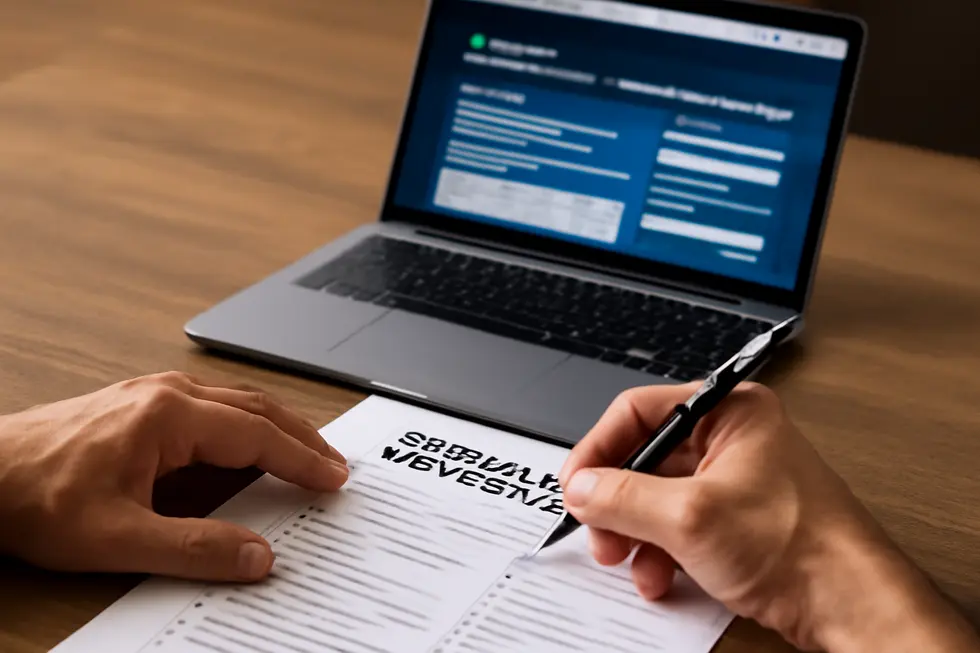
1. Навигация по поиску товарного знака: Обеспечение уникальности вашего слогана до регистрации
Регистрация слогана в качестве товарного знака начинается с тщательного и всестороннего поиска товарного знака чтобы подтвердить свою уникальность и избежать конфликтов. Поскольку слоганы не могут быть защищены авторским правом, защита товарного знака зависит от различительной способности и отсутствия сходства до степени смешения с существующими знаками. Ведомство по патентам и товарным знакам США (USPTO) предоставляет Систему электронного поиска товарных знаков (TESS) - важнейший инструмент для поиска зарегистрированных товарных знаков, которые могут пересекаться с вашим слоганом. Этот поиск должен охватывать точные фразы, вариации написания и фонетические сходства, чтобы выявить все возможные конфликты.
Помимо федеральной регистрации, необходимо изучить товарные знаки общего права-незарегистрированные знаки, используемые в торговле, которые все еще имеют юридический вес. Для этого необходимо провести поиск на онлайн-платформах, в бизнес-справочниках и государственных базах данных товарных знаков, чтобы обнаружить использование слоганов, которые могут представлять опасность. Поскольку этот процесс может быть сложным, обратитесь к адвокату по товарным знакам или наймите профессиональную службу поиска, чтобы повысить точность и снизить юридические риски.
Интерпретация результатов поиска требует тщательной оценки: ваш слоган не должен сильно напоминать другие товарные знаки в той же или смежных категориях товаров или услуг, так как ВПТЗ США может отклонить заявки по причине вероятности смешения. Если ваш слоган включает стилизованные элементы или уникальные шрифты, эти особенности дизайна также следует сравнить, чтобы избежать непреднамеренного дублирования.
После того как поиск подтвердит наличие товарного знака, следующим шагом будет подача заявки на товарный знак в USPTO. Точная классификация ваших товаров или услуг очень важна, поскольку USPTO распределяет товарные знаки по 45 классам. Предоставление полной и точной информации, а также уплата необходимых пошлин могут ускорить процесс рассмотрения заявки.
После подачи заявки необходимо следить за ее статусом и оперативно реагировать на сообщения ВПТЗ. После регистрации символ ® обозначает ваши исключительные права, а установление четких правил использования бренда гарантирует его правильное использование.
Такая тщательная подготовка гарантирует юридическую защиту вашего слогана в соответствии с законодательством о товарных знаках, а не об авторском праве, которое не защищает слоганы из-за их краткости и отсутствия фиксации. Для получения всесторонней помощи в этом процессе можно воспользоваться ресурсами, подобными тем, что находятся на сайте как зарегистрировать товарный знак предлагают практические рекомендации. Для более широкого понимания защиты товарных знаков посетите эту статью на охраняемые законом товарные знаки.
2. Как подготовить и подать заявку на охрану товарного знака для слогана
Регистрация слогана в качестве товарного знака требует тщательной подготовки и соблюдения определенных процедур для обеспечения исключительных прав. Процесс начинается с проведения всестороннего поиска товарного знака, чтобы убедиться, что ваш слоган уникален и не противоречит существующим регистрациям. Этот шаг помогает предотвратить потенциальный отказ по причине сходства или предыдущего использования.
Далее вы должны собрать необходимую информацию для подачи заявки, включая ваши личные и деловые данные, четкое описание товаров или услуг, связанных со слоганом, и их соответствующую классификацию в соответствии с Руководством USPTO по идентификации товарных знаков. Вам также необходимо указать, на чем основывается подача заявки - на фактическом использовании слогана в торговле или на намерении его использовать, предоставив соответствующие доказательства или заявление. Если слоган имеет уникальную стилизацию или цвета, к заявке следует приложить подробное описание этих элементов.
Сама заявка заполняется в режиме онлайн через электронную систему подачи заявок на регистрацию товарных знаков USPTO (TEAS). Точность заполнения формы имеет решающее значение, чтобы избежать задержек и дополнительных расходов. После подачи и оплаты пошлин, начиная с $350 за класс товаров или услуг, вы получите квитанцию о подаче заявки с серийным номером для отслеживания хода рассмотрения.
Эксперт ВПТЗ США проверяет заявку на соответствие требованиям и возможные конфликты. Если заявка одобрена, слоган публикуется в официальном бюллетене, что открывает возможность для третьих лиц опротестовать регистрацию, если они считают, что она нарушает их права. Если в ходе рассмотрения возникают какие-либо проблемы, для сохранения жизнеспособности заявки необходимо оперативно реагировать на действия ведомства.
После регистрации поддержание товарного знака требует периодической подачи заявок и уплаты сборов для сохранения ваших прав. Для предприятий, продающих продукцию через Интернет, регистрация слогана в качестве товарного знака позволяет участвовать в программах защиты бренда на различных платформах, что повышает ваши правовые гарантии.
Такой детальный подход гарантирует юридическое признание и защиту отличительных особенностей вашего слогана. Для получения дальнейших рекомендаций обратитесь к Электронная система подачи заявок на товарные знаки (TEAS) USPTO предлагает обширные ресурсы.
О том, как защитить свой бренд, читайте в нашем обзоре охраняемые законом товарные знаки.
3. Освоение пути регистрации товарного знака в USPTO: Исчерпывающее руководство по защите вашего слогана
Хотя слоганы не могут быть защищены авторским правом из-за их краткости и отсутствия требуемой оригинальности, обеспечение охраны товарного знака предлагает практичную и мощную альтернативу. Регистрация слогана в качестве товарного знака в USPTO требует стратегического подхода для обеспечения надежных правовых гарантий.
Начните с проведения комплексного поиска товарных знаков, чтобы убедиться, что ваш слоган уникален и не является уже заявленным. Этот шаг позволит избежать потенциальных отказов или конфликтов с существующими знаками. Затем тщательно подготовьте заявку, указав в ней информацию о вашей компании и четкое описание товаров или услуг, связанных с вашим слоганом, в соответствии с системой классификации ВПТЗ США.
В заявке должно быть указано, используете ли вы слоган в коммерческих целях или планируете это сделать в ближайшее время. Подача заявки осуществляется в электронном виде через Систему электронных заявок на товарные знаки (TEAS), требующую точного заполнения форм и уплаты соответствующих пошлин.
После подачи заявки USPTO присваивает серийный номер и начинает экспертизу, которую проводит юрист, тщательно проверяющий ваш слоган на соответствие, отличительность и наличие противоречий. Одобрение приводит к публикации в "Официальном вестнике", где у третьих лиц есть 30 дней, чтобы опротестовать регистрацию, если они предвидят нарушение прав.
Если возражения не возникнут или будут удовлетворены, а все юридические требования - например, доказательство коммерческого использования - будут выполнены, регистрация товарного знака будет предоставлена, как правило, в течение 8-18 месяцев. Зарегистрированный товарный знак обеспечивает общенациональную защиту, позволяя вам использовать символ ® и энергично отстаивать свои права.
Для поддержания товарного знака в силе необходимо своевременно подавать заявки, чтобы сохранить его действительность на неопределенный срок. Поскольку слоганы отличаются от логотипов или фирменных наименований, для их комплексной защиты необходимо подавать собственные заявки на товарные знаки.
Этот продуманный процесс объясняет, почему именно товарный знак, а не авторское право, является подходящим способом защиты слоганов, обеспечивая долговременные и осуществимые права в коммерции. Подробные шаги и доступ к официальным формам можно найти на ресурсах USPTO, посвященных товарным знакам.
Узнайте больше о том, как товарные знаки эффективно защищают идентичность бренда, на сайте юридически защищенный товарный знак.
Заключительные мысли
Хотя слоган может служить важнейшим элементом идентичности вашего бренда, он не может быть защищен законом об авторском праве, поскольку не обладает необходимой оригинальностью и закрепленностью. Вместо этого закон о товарных знаках предлагает наиболее эффективный способ юридической защиты вашего слогана, предоставляя вам исключительные права в связи с вашими товарами или услугами. Понимая ограничения авторского права и преимущества защиты товарного знака, владельцы бизнеса могут принять упреждающие меры для защиты своих слоганов и сохранения конкурентного преимущества на рынке. Регистрация слогана в качестве товарного знака гарантирует вам долгосрочную ценность бренда и защиту от несанкционированного использования или нарушения прав.
Получите свой товарный знак сегодня! Тысячи людей защитили свой бренд, подав заявку на товарный знак. А чего ждете вы? Начните подавать заявку на товарный знак!
О нас
Лучший в мире сайт для регистрации товарных знаков и защиты вашего бренда, названия, логотипа или слогана. Мы предоставляем бесперебойную и надежную платформу для быстрой защиты вашей интеллектуальной собственности, помогая вам уверенно и легко создавать и защищать свою деловую идентичность.

